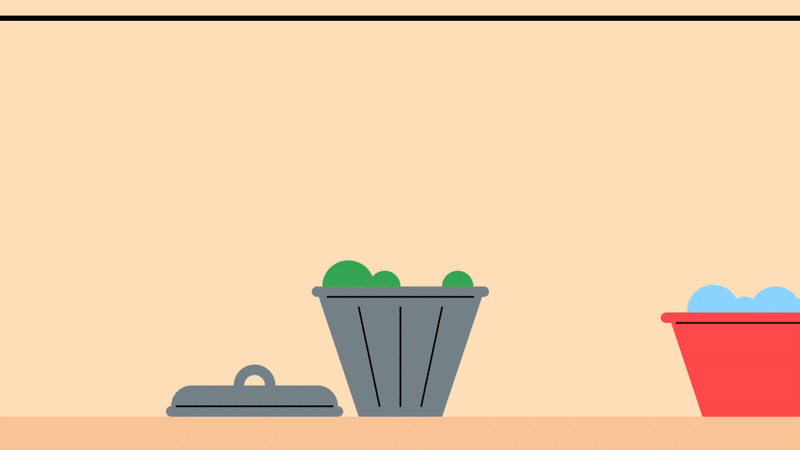
Learn how to wash up
You’ll need
- Washing up liquid
- Three washing up bowls or buckets (per team)
- Warm water
- Sponge and scourer
- Tea towels
- Dirty pans, crockery and blunt utensils
- Washing up gloves
Before you begin
- Use the safety checklist to help you plan and risk assess your activity. Additional help to carry out your risk assessment, including examples.
- Make sure all young people and adults involved in the activity know how to take part safely.
- Make sure you’ll have enough adult helpers. You may need some parents and carers to help if you’re short on helpers
Setting up this activity
- Make sure you have enough dirty plates, cups, bowls and so on, do this after snack time or a food-based activity.
- You may want to provide washing up gloves, especially for people who may not want to touch the items.
- Each team needs a cleaning station, set up using the buckets and bowls:
-
- The first bucket or bowl is empty and for food waste.
- The second contains warm soapy water – you or an adult should check the water is a safe temperature.
- The third contains clean water for rinsing.
- The fourth is for drying.
Be a clean machine
- Gather everyone together and tell them you’re going to practice washing up.
- Each team should create their cleaning station using buckets and bowls.
- The team should then position themselves along the line, with one or two people at each cleaning station.
- Larger groups may need to allocate more than two people per station and take turns to do their task.
- At regular intervals, the team should move down the line to the next station, so they experience each part.
- Everyone at the first station should empty cups and scrape uneaten food off into a bin, before passing it to the washing station. Make sure food waste goes into a compost or food waste recycling bin if available.
- The people at the next station should wash the items in the hot, soapy water. They should try to wash cleaner items first. They should clean them using the scourer and sponge, and pass to the rinsers.
- Everyone at the rinsing station should lightly wash the items with clean water before handing them to the dryers.
- The people at the drying station should carefully dry and put each item away
- The dryers can also check that the items are completely clean and decide if they need another wash.
- You may want to have another team who helps to put items away at the end.
- Everyone should check there’s nothing left to wash up, then rinse sponges and scourers, hang up tea towels, and either use the cooled water for watering plants or safely pour it down a drain.
- You could add in a competitive element for older groups, such as having a race to do all the items before other teams. You could also have it as a timed event.
Reflection
This activity helps everyone understand the importance of camp hygiene and of teamwork. They also honed their practical cleaning skills to spruce up food areas after cooking and eating.
The group should chat about why it’s important to wash up, even when the weather’s cold and wet, and they’d prefer not to. Their reasons might include the fact it means there are always clean dishes available or that it can help everyone avoid tummy upsets. Now they’re experts, everyone should have washing, rinsing or drying top tips, such as washing before it gets dark or cleaning greasy pans last.
The group should also talk about the benefits of team work, why ‘many hands might light work’ and congratulate each other on being helpful. It’s a reminder that if everyone helps out, less enjoyable jobs like washing up get done quickly and there’s more time for playing.
Safety
All activities must be safely managed. You must complete a thorough risk assessment and take appropriate steps to reduce risk. Use the safety checklist to help you plan and risk assess your activity. Always get approval for the activity, and have suitable supervision and an InTouch process.
- Water games and activities
Be careful when doing activities with, in, or near water. Check surfaces and reduce the risk of slipping where possible. Make sure you have appropriate supervision for this activity.
- Food
Remember to check for allergies, eating problems, fasting or dietary requirements and adjust the recipe as needed. Make sure you’ve suitable areas for storing and preparing food and avoid cross contamination of different foods. Take a look at our guidance on food safety and hygiene.
- Sharp objects
Teach young people how to use sharp objects safely. Supervise them appropriately throughout. Store all sharp objects securely, out of the reach of young people.
- Outdoor activities
You must have permission to use the location. Always check the weather forecast, and inform parents and carers of any change in venue.
- To make the activity easier, you might want to show the groups each step of the process beforehand, such as how to order their washing up or use a sponge and scourer.
- If needed, let people be in bigger groups to make sure everyone’s supported in taking part in the activity. A young leader could join a group to help people to take part, too.
- This game can be played sitting or standing, either on the floor or on chairs. Make sure to adapt to whichever way works best for everyone and make sure any actions are things everyone can do.
- Make sure that all the materials are at a level that can be easily worked on by wheelchair users.
- Some people might not like how it feels to touch some items or the washing up liquid may irritate their skin. People could wear washing up gloves or they may want to take on another role, such as moving the teams between stations.
- If anyone wants to skip a station, that’s OK. No-one should be forced to touch something they feel uncomfortable with doing, as it may be distressing for them.
All Scout activities should be inclusive and accessible.
Split the group into two teams and see which is the fastest to finish. You could also challenge them to wash up at least twice at home over the next week, with an adult’s permission.

